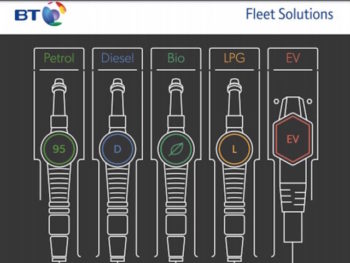Forthcoming clean air zones and the shift to WLTP are presenting major challenges for fleets, according to BT Fleet Solutions’ newly published 2018/19 Operational Fleet Insight Report but companies are readying themselves for change. Natalie Middleton looks at the main findings.

This is a challenging time to be part of the operational fleet industry. Economic and political uncertainty, rising costs, regulatory changes and environmental challenges make for a unprecedented list of obstacles for fleet managers, as revealed by BT Fleet Solutions’ latest Operational Fleet Insight report.
Now in its third year and published, once again, with the AA, the report sought the opinions of 505 key fleet decision makers and 16 industry experts on clean air and alternative fuels and sheds light on how businesses are responding to the latest fleet challenges.
1. A third of fleets don’t have a clean air zone strategy in place
With councils in five cities across the UK in the process of submitting final clean air zone plans to the Government– and a great many more exploring pollution-curbing measures, the research finds that there is much work needed to be done to ensure fleets are ready for the 1 January 2020 roll-out of such schemes.
According to the research, although on average respondents said half of the vehicles in their fleet are currently compliant with 2020 clean air zones, a third of fleets don’t have a clean air zone strategy in place – of which, half said that lack of clarity and lack of information were among the reasons why they’ve not set out to make their fleet ‘2020-compliant’.
Although there was broad business support for cleaner air – 77% agreed that “tackling air pollution is important to my organisation”, rising to 89% of those with larger fleets – many also noted a visible tension between the concept of cleaner air and the commercial reality of putting plans into place to meet the new regulations.
2, Fleets supportive of localised control but concerned over mixed approaches
When questioned about the advantages and disadvantages of local authorities being able to have autonomy on the rules and arrangements for their own clean air zones, fleets were broadly supportive of such localised control with 72% supporting this.
However in the qualitative interviews, some sounded a note of caution that this could cause further confusion and become hard to manage for fleets operating on a national scale, with different rules applying depending on the city.
Comments included: “There is a danger we’re going to have a patchwork of different standards here. We’ve got, potentially, 30 different conurbations now working on their own plans independently.”
The industry experts who helped inform the report backed up this and empathised with fleet managers struggling to plan for a potentially fragmented clean air regime, calling for a more cohesive national policy framework to be put in place to set clearer parameters.
3. More than 40% of fleets unaware of shift to WLTP
Although the Worldwide harmonized Light Vehicles Test Procedure (WLTP) protocol kicked in from 1 September for fuel and emissions testing cycles, only 58% of fleet managers were aware of the change.
With WLTP already bringing higher taxation for fleets and fleet drivers – and a completely new taxation scheme on the cards as HMRC looks to switch to new formats of VED and Company Car Tax for WLTP-tested cars from April 2020 with an announcement anticipated in the autumn 2018 Budget – the fleet industry has spoken out about the need to take action now on WLTP.
4. Fleets actively adopting alternative fuels
While fleets may be worryingly unaware of clean air zones and WLTP changes, more positive news was seen among the research on alternatively fuelled vehicles, which identified a 19% expected increase in the number of fleet managers using electric vehicles in five years’ time.
However, while some are leading the way, others are struggling to plan for a fleet where it will cost significant sums to ‘green the fleet’.
To encourage take-up of alternative fuels and achieve the common goal of cleaner air, the industry would like to see further government incentives – 86% believe monetary incentives or grants would have a positive impact on the uptake of alternatively-fuelled vehicles. Fleets would also like to see further investment in charging/refuelling infrastructure, and more effective collaboration between government, trade bodies, manufacturers and the fleet industry.
The report also showed an ongoing downturn in diesel usage by fleets. A total of 16% respondents said they expected a reduction in the percentage of fleet managers using diesel-powered vehicles in five years’ time. However, there was recognition of how anti-diesel sentiment has skewed the market and 73% of fleet managers said they believe diesel vehicles have an unfair reputation for producing harmful emissions.
Fleets also expressed concerns over a lack of suitable alternatives to diesels in the commercial vehicle sector.
5. Stable but different future in sight
The report showed that fleets are being hit by change at an unprecedented rate – one respondent said: “I’ve worked in and around fleet for around 30 years, and I’ve never known as much change in a small period as right now.”
However, fleets do not expect the current period of instability to last. They believe the next five years will bring change and will then be followed by a new, more stable fleet landscape with new opportunities.
“I think as an industry we realise changes are coming, and that we need to adapt,” summed up one respondent”

